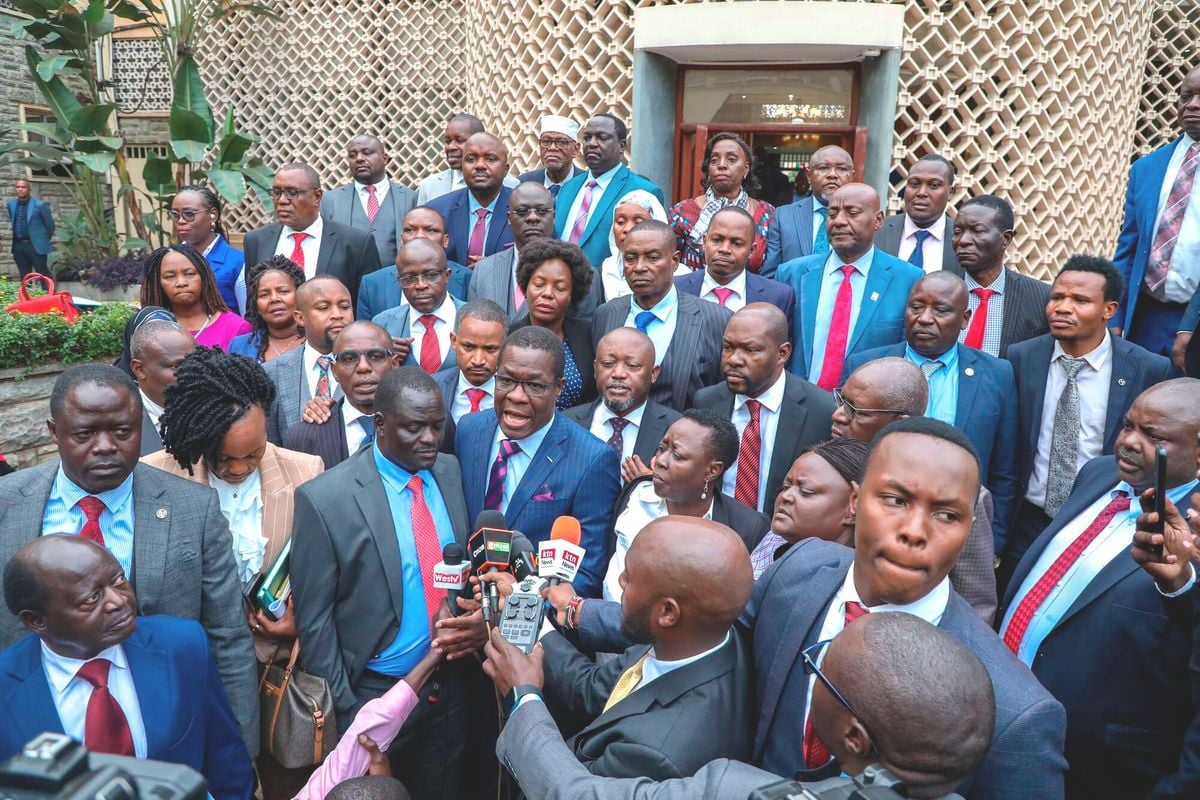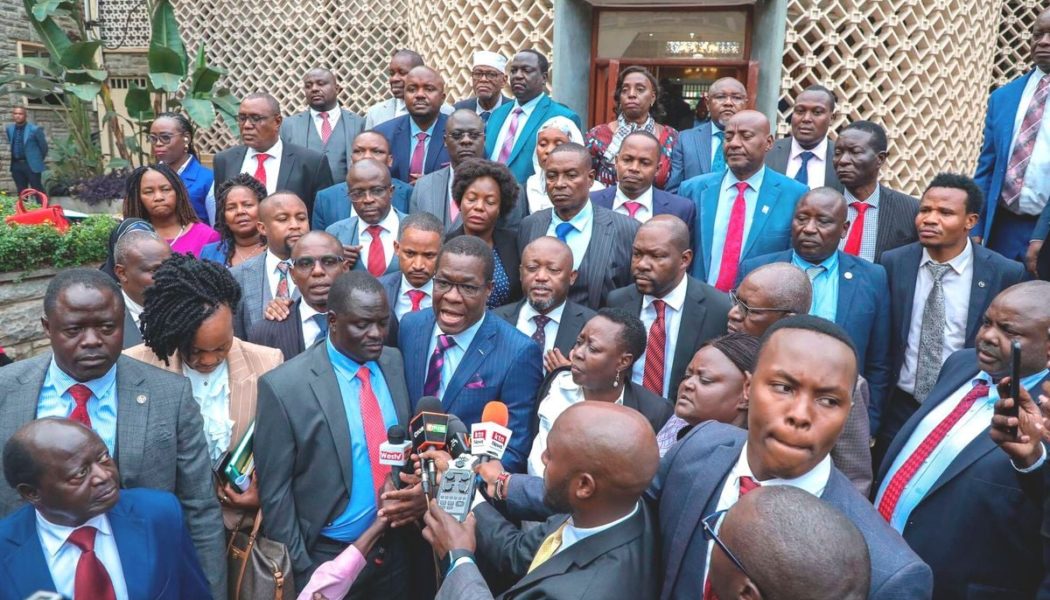
Treasury Cabinet Secretary Njuguna Ndung’u on Thursday raised a storm in Parliament over his warning of Sh200 billion budget cuts should MPs scrap a handful of proposed tax increases in the Finance Bill, with legislators accusing him of blackmail.
The threat of budget cuts came ahead of debate on the Finance Bill and on a day protest marches against proposed taxes spread across Kenya.
The government plans to raise Sh302 billion in additional taxes to reduce the budget deficit.
But MPs, most of them from the Opposition Azimio coalition, accused the Treasury of usurping the role of Parliament in pushing the lawmakers to approve the controversial Bill.
Prof Ndung’u in a letter to the Clerk of the National Assembly laid bare the dilemma that has confronted his office, warning of deep cuts targeting, among others, hiring of teachers and constituency development funds should MPs reject the Bill.
The Treasury was expected to respond to an earlier letter from the Clerk seeking views on how to align the budget with changes made to the Finance Bill by the National Assembly Finance and Planning Committee, which had scrapped some controversial taxes on items like bread and cars while proposing higher levies on fuel.
But the Treasury appeared to provide information beyond what was requested, notably budget cuts in the event that lawmakers scrapped the new taxes in the Finance Bill, angering lawmakers.
“Going through this letter, the CS [Cabinet Secretary], who is not elected by anyone in this country, is purporting to direct this House and therefore treading on very slippery and dangerous grounds. First by purporting to dictate to the House on what it’s supposed to do in its legislative role,” said Opiyo Wandayi, the Minority Leader in the National Assembly.
“The CS is also anticipating debate because as far as I am aware, we are still at the stage of debating this Bill. The letter flies in the face of the constitutional provisions and separation of powers.”
National Assembly Speaker Moses Wetang’ula defended Prof Ndung’u against accusations of blackmail.
In his communication to the House, Mr Wetangu’la said that the CS’ advisory was a reminder to the House of its constitutional and statutory obligations.
“I don’t view it as a directive in the manner argued by the Leader of the Minority,” said Mr Wetang’ula.
“In its decision-making, the House is only bound by the Constitution and the law. The ultimate decision lies with the House.”
Notable budget cuts include Sh18.9 billion meant for hiring Junior Secondary School intern teachers on a permanent basis, Sh15 billion for the National Government-Constituency Development Fund (NG-CDF) and Sh21.77 billion for connecting mostly poor households to the national electricity grid under the Last Mile Connectivity.
Ongoing road projects could lose Sh15.1 billion, Ministry of Defence Sh7.8 billion and water projects Sh11.6 billion. The Treasury says scrapping the handful of proposed tax hikes in the Finance Bill would lead to a revenue shortfall of Sh200 billion in the 2024/25 budget, meaning equivalent spending cuts would have to be made.
Lawmakers on Thursday debated the Bill at its second reading in the House, with the proposed law getting backing from 204 MPs against 115.
Kimani Ichung’wah, the National Assembly Majority Leader, said MPs will meet next Tuesday to vote on the proposed changes to the Bill.
President William Ruto has a majority in Parliament, although some lawmakers allied to his Kenya Kwanza coalition have expressed reservations about the Bill.
The Finance Committee urged the government on Tuesday to scrap some new taxes proposed in the Bill, including new ones on car ownership, bread, cooking oil and financial transactions. It also recommended that a fuel tax towards road maintenance be increased.
Dr Ruto was elected almost two years ago on a platform to uplift Kenya’s working poor, but has faced repeated anti-tax protests. He has defended the tax increases, saying the government needs to reduce its reliance on borrowing.
Protesters, who on Thursday braced tear gas and water cannons, say the tax rises will hurt the economy and raise the cost of living for Kenyans who are already struggling to make ends meet.
The International Monetary Fund has urged the government to increase revenues in its 2024/25 budget to reduce borrowing.
The Treasury has proposed to slash Sh18.9 billion from the Teachers Service Commission (TSC), which would have been used for hiring the Junior Secondary School teachers.
Allocation to the last mile connectivity for constituencies, which had been allocated Sh14.5 billion, has been deferred. Another Sh4.57 billion, still under the last mile connectivity project, has also been slashed, taking the total cut for the State Department for Energy to Sh21.77 billion.
Completion of ongoing road projects, now a punching bag for the Ruto administration, will be delayed further should the legislators agree with the changes proposed by the Kimani Kuria-led Finance committee, with the Treasury slashing Sh15.1 billion.
Payment of pending bills has also been reduced by Sh5 billion while the Kenya Revenue Authority will lose Sh4.7 billion. Kenya Airways, Civil Servants Insurance Scheme and Equalization Fund arrears will see their allocations cut by Sh1 billion each.
The various water projects will lose Sh11.6 billion, irrigation projects Sh3.7 billion, and the Galana Kulalu food security project Sh1 billion.
The counties’ share of the shareable revenue will lose Sh5 billion, fertiliser subsidy Sh5 billion and sugar reforms Sh1.7 billion.
The ICT Authority will lose Sh6.7 billion and the State Department for Medical Services Sh4.7 billion.
The Ministry of Defence will lose Sh7.8 billion, which includes Sh5 billion that was meant for modernisation and Sh2.8 billion for security operations.
State Department for Agriculture is to forgo Sh6.7 billion that includes Sh5 billion for the fertiliser subsidy programme and Sh1.7 billion for sugar reforms.









